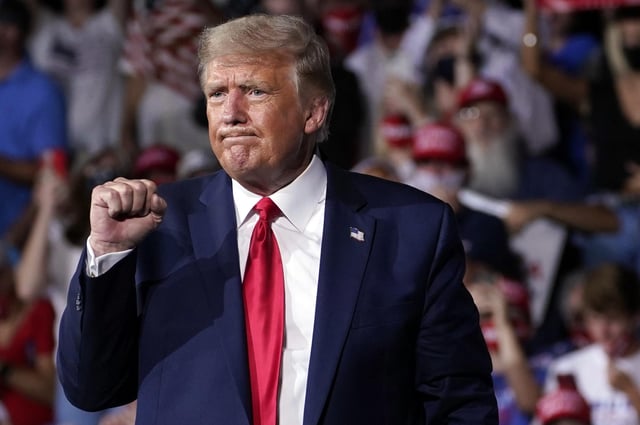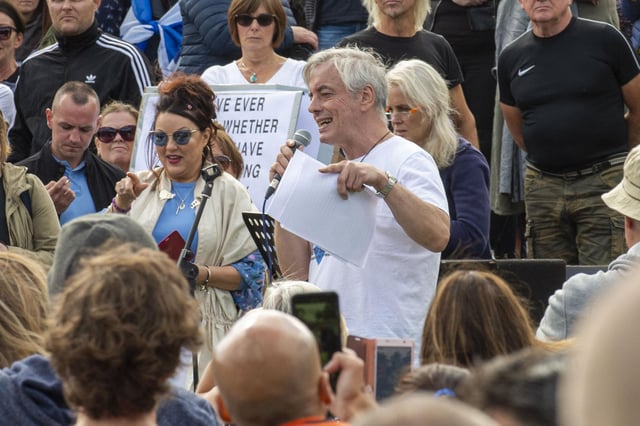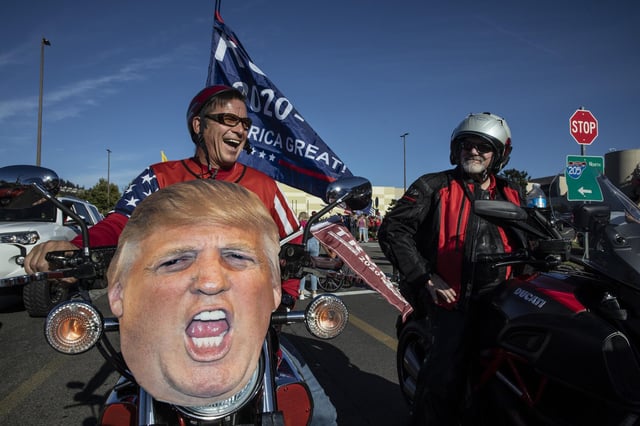
Donald Trump Nobel Peace Price: Why US President's nomination is a far-right publicity stunt
It is regarded as the world’s pre-eminent honour, conferred upon the greatest minds who have dedicated their lives to the pursuit of progress, justice, and a lasting peace.
By Martyn Mclaughlin
Wednesday, 9th September 2020
 President Donald Trump has now been nominated twice for the Nobel Peace Prize - by the same right-wing politician. Picture: AP/Evan Vucci
President Donald Trump has now been nominated twice for the Nobel Peace Prize - by the same right-wing politician. Picture: AP/Evan Vucci
Thanks to its wide-ranging and easily-exploited nomination process, however, the Nobel Peace Prize is also a vehicle that is prone to manipulation by those seeking a quick burst of publicity.
If there is anything at all newsworthy about the fact the US president Donald Trump has been nominated for the 2021 award - a development that is being widely reported around the world - it has only to do with the person who put his name forward.
In Mr Trump’s case, that individual is Christian Tybring-Gjedde, a far-right Norwegian parliamentarian and member of the country’s Progress Party. His name may not be familiar to international audiences, but until today Mr Tybring-Gjedde’s highest-profile action was, well, nominating Donald Trump for the Nobel Peace Prize.
Yes, that’s right. In 2018, the 57-year-old and his colleague, Per-Willy Amundsen, nominated Mr Trump for the same honour, citing the “huge and important step" he had taken towards peace in the Korean peninsula.
This time around, Mr Tybring-Gjedde - who is fiercely anti-immigration and was investigated by police after he delivered a controversial speech on multiculturalism - cited the 73-year-old’s efforts to broker peace between Israel and the United Arab Emirates.
If you are starting to notice a pattern, it is entirely deliberate. Mr Tybring-Gjedde has already appeared on Fox News - Mr Trump’s network of choice - to talk him up.
Prominent Trump supporters in the US, including Mark Levin, Lou Dobbs, and Dean Browning, have also been sharing news articles reporting the nomination and offering their congratulations.
For an American audience idly flicking through their social media feeds without the time or inclination to read further, it looks as if Mr Trump is about to receive the ultimate honour. In truth, it is little more than a gimmick which will puff up his ego and distract from day to day events.
It did not take Mr Trump long to greet the commendation with his characteristic reserve and modesty, tweeting multiple links to coverage of his nomination, and offering thanks to well-wishers.
There seems little doubt that he covets the prize. Only last year, he claimed Japanese prime minister Shinzo Abe had nominated him for the award. Mr Abe, it should be pointed out, has never confirmed this was the case.
Either way, Mr Trump did not win, but the prospect of a sitting prime minister nominating him - instead of a hardline parliamentarian on the fringes of Norwegian democracy - would have lent his candidacy greater weight.
Which brings us to the fundamental problem with the nominations system for the Nobel Peace Prize - it is a meaningless indicator of false glory.
The roll call of people eligible to submit a nomination is not inexhaustible, but it is extensive, and it extends far beyond individuals like Mr Tybring-Gjedde, who happen to serve on a national parliament or assembly.
That particular category alone captures tens of thousands of politicians around the world, many of whom - like Mr Tybring-Gjedde - have forged a career from divisive rhetoric and cheap publicity stunts.
As well as parliamentarians and government ministers, the nomination process is open to university professors, professors emeriti and associate professors of history, social sciences, law, philosophy, theology, and religion, as well as university rectors and university directors or their equivalents.
The academic field alone spans a field of potential nominators as broad as several hundred thousand-strong. In the US alone, research by the National Centre for Education Statistics indicated that there are more than 300,000 individuals who hold the status of professor or associate professor.
While the actual award itself continues to be held in the highest esteem, the result of the wide-open nominations process has allowed a miscellany of tyrants and celebrities to make the shortlist down the years.
The Norwegian Nobel Institute says that the international scope of the award and the “broad eligibility” of nominators helps to ensure that “a great variety of candidates from all corners of the world” are brought forward to the committee’s attention every year.
That is indeed true. Adolf Hitler, Benito Mussolini and Joseph Stalin received five nominations between them. In more recent times, Vladimir Putin has also been nominated for the prize. Elsewhere, the late pop star, Michael Jackson, was also nominated, part of a trend which has seen the number of nominees swell to more than 300 in any given year.
Generally, however, it is difficult to know exactly who has been nominated, unless the nominator breaks cover and makes it public. Otherwise, the complete list of eligible nominees of any year’s prizes is kept a closely guarded secret, and is not disclosed for 50 years, a restriction imposed by the Nobel statutes.
It barely requires pointing out, but neither the Fuhrer, the King of Pop, or any of the other nominees above went on to win the prize, and the same fate may befall Mr Trump, whose extensive list of personal honours includes the Golden Raspberry Award for Worst Supporting Actor, a star on the Hollywood Walk of Fame, and membership of the WWE Hall of Fame.
If he is unable to add the Nobel to that list, he can at least console himself with the knowledge that he will be in good company. Previous occupants of the White House, including Taft, Harding, Hoover, Roosevelt, Truman, and Eisenhower, were all nominated for the prize.
Alas, all were destined to remain bridesmaids. And all were denied the chance to make the WWE Hall of Fame.





 President Donald Trump has now been nominated twice for the Nobel Peace Prize - by the same right-wing politician. Picture: AP/Evan Vucci
President Donald Trump has now been nominated twice for the Nobel Peace Prize - by the same right-wing politician. Picture: AP/Evan Vucci